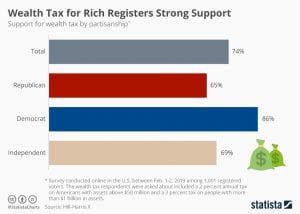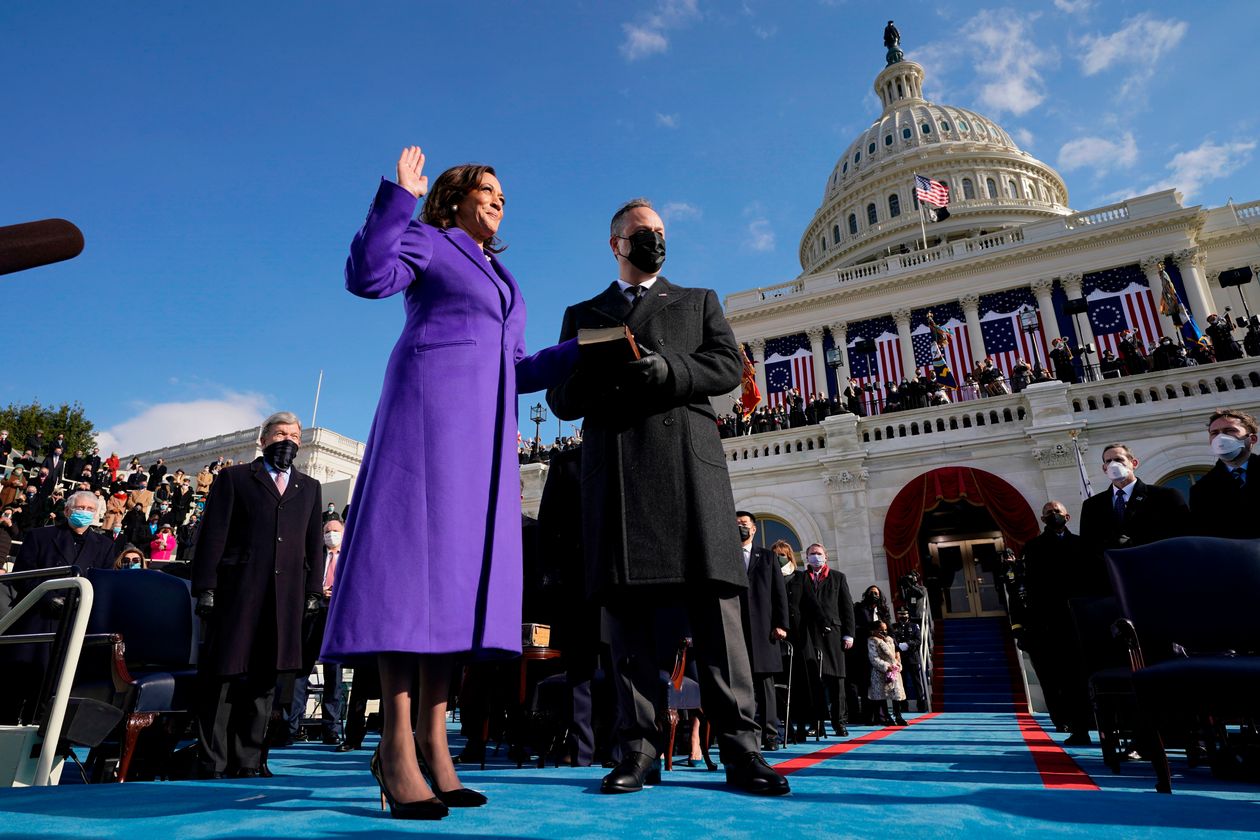 The year 2021 has already been a ground-breaking one for women in national politics. Vice President Kamala Harris became the first woman and person of color to hold the office, the 117th Congress includes the largest number of female members in U.S. history, and President Joe Biden’s cabinet will ultimately include 11 women, setting a new record. The number of women in the cabinet is particularly noteworthy; with 13 men making up the rest of the cabinet, the positions are almost evenly split (although among the heads of the executive departments, there are five women and ten men).1 During this Women’s History Month, just over 100 years since women had their right to vote ratified in the Constitution, the continued expansion of the role of women in government is worth celebrating.
The year 2021 has already been a ground-breaking one for women in national politics. Vice President Kamala Harris became the first woman and person of color to hold the office, the 117th Congress includes the largest number of female members in U.S. history, and President Joe Biden’s cabinet will ultimately include 11 women, setting a new record. The number of women in the cabinet is particularly noteworthy; with 13 men making up the rest of the cabinet, the positions are almost evenly split (although among the heads of the executive departments, there are five women and ten men).1 During this Women’s History Month, just over 100 years since women had their right to vote ratified in the Constitution, the continued expansion of the role of women in government is worth celebrating.
However, despite a trend that has seen more women occupying elected offices around the country each year, the overall representation of women in American politics remains disproportionately low. Women make up just under 51 percent of the U.S. population—or to put it plainly, more Americans identify as women than do not.2 Yet women occupy only 26.4 percent of congressional seats (House and Senate), 30.3 percent of state-level executive offices, and 30.9 percent of state-level legislative seats.3
VIEW: “Women in Elective Office 2021,” from Rutgers University
The numbers are even more disproportionate when one looks at women of color in political office. Women of color make up 18.7 percent of the U.S. population, yet they occupy only 9.2 percent of congressional seats, 5.8 percent of state-level executive offices, and 7.5 percent of state-level legislative seats.4 For national and state governments to be genuinely representative of the population by sex and race, we should expect there to be nearly twice as many women in office and nearly three times as many women of color.
VIEW: “Women of Color in Elective Office 2021,” from Rutgers University
There are a litany of factors to account for this discrepancy, from issues as esoteric as gerrymandering and the prolonged incumbency of men to problems as fundamental as systemic racism and barriers to entry for women in careers which lend themselves to running for elected office (such as lawyers, judges, and CEOs).5 However, the discrepancy between the female population and female representation has not gone unnoticed. Dozens of grassroots organizations, nonprofits, and political action committees have emerged and dedicated themselves to supporting women who are interested in running for office at all levels of government. Many of the organizations have seen tremendous success and count dozens of women currently serving in government among their alumnae.
You can learn more about these organizations, ways to get involved, and how to prepare to run for office yourself using these links:
IGNITE (nonpartisan)
VoteRunLead (nonpartisan)
Emily’s List (liberal-progressive)
Maggie’s List (conservative)
Higher Heights for America (liberal-progressive/women of color)
Republican Women for Progress (conservative)
Run for Something (liberal-progressive)
Discussion Questions:
- What particular challenges might women face when running for office in your town, in your state, or nationwide?
- What other groups do you imagine are underrepresented or overrepresented in government? What reasons might there be to explain this?
- As mentioned before, President Biden’s cabinet now consists of 11 women and 13 men, making it closer to being representative of the female share of the population than any other cabinet. Should government bodies make more of an effort to have their membership reflect the demographics of their constituency? If so, how? If not, why not?
- Within the political parties themselves, there is a discrepancy in female representation, with far more women running and being elected as Democrats than as Republicans. Currently in Congress, of the 141 women serving, 103 are Democrats (38.3 percent of the party’s seats) and 38 are Republicans (14.6 percent of the party’s seats). Both of these totals fall below the female proportion of the overall population, but why do you believe there is such a discrepancy between the parties?
Related Posts:
Gender Identity and Official IDs
As always, we encourage you to join the discussion with your comments or questions below!
Sources
Featured Image Credit: ANDREW HARNIK/PRESS POOL
[1] https://www.washingtonpost.com/politics/2021/01/15/biden-will-have-more-women-his-cabinet-than-any-president-ever-other-countries-still-do-better/
[2] https://www.census.gov/quickfacts/fact/table/US/LFE046219
[3] https://cawp.rutgers.edu/women-elective-office-2021
[4] https://cawp.rutgers.edu/women-color-elective-office-2021
[5] https://www.ilo.org/infostories/en-GB/Stories/Employment/barriers-women#unemployed-vulnerable
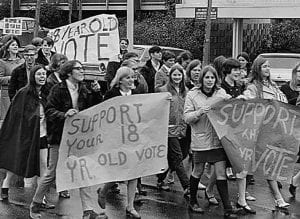 Congress passed the 26th Amendment in March 1971; it was ratified by the states and signed by President Richard Nixon by July of that same year.1 The amendment lowered the voting age to 18. It reads:
Congress passed the 26th Amendment in March 1971; it was ratified by the states and signed by President Richard Nixon by July of that same year.1 The amendment lowered the voting age to 18. It reads: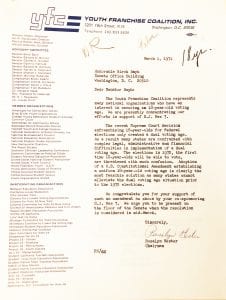
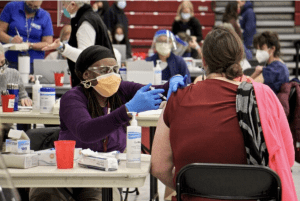
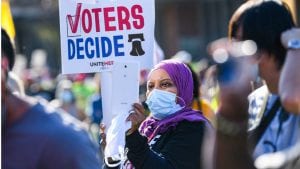 The past several election cycles have seen high-stakes fights over access to the ballot and the rules that govern elections. In 2013, the Supreme Court invalidated provisions of the Voting Rights Act, thus making it easier for states to change their voting laws.1 In the years since, conservatives in Congress and in state legislatures have argued in favor of policies that tighten voter ID requirements and voting processes.
The past several election cycles have seen high-stakes fights over access to the ballot and the rules that govern elections. In 2013, the Supreme Court invalidated provisions of the Voting Rights Act, thus making it easier for states to change their voting laws.1 In the years since, conservatives in Congress and in state legislatures have argued in favor of policies that tighten voter ID requirements and voting processes.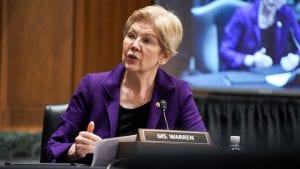 During her 2020 presidential bid, Senator Elizabeth Warren, D-Mass., put forward a tax on the wealthiest Americans—a so-called ultra-millionaire tax—as one of her central proposals.1 And on March 1, 2021, Warren introduced the Ultra-Millionaire Tax Act, which would “create an annual tax of 2 percent on the net worth of households and trusts between $50 million and $1 billion and a tax of 3 percent on net worth above $1 billion. The rate for net worth above $1 billion would increase to 6 percent if a ‘Medicare for All’ health care plan is enacted.”2
During her 2020 presidential bid, Senator Elizabeth Warren, D-Mass., put forward a tax on the wealthiest Americans—a so-called ultra-millionaire tax—as one of her central proposals.1 And on March 1, 2021, Warren introduced the Ultra-Millionaire Tax Act, which would “create an annual tax of 2 percent on the net worth of households and trusts between $50 million and $1 billion and a tax of 3 percent on net worth above $1 billion. The rate for net worth above $1 billion would increase to 6 percent if a ‘Medicare for All’ health care plan is enacted.”2